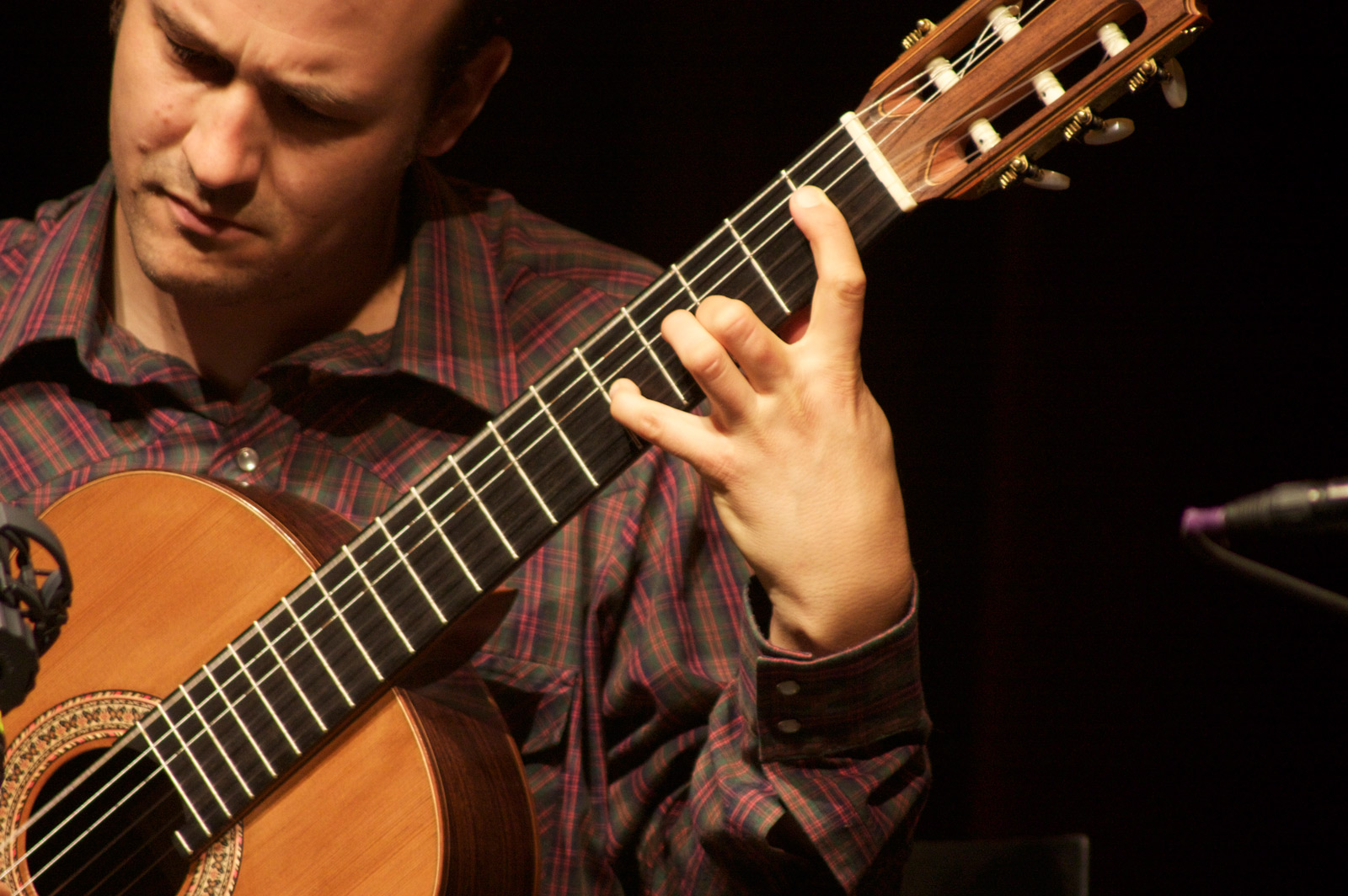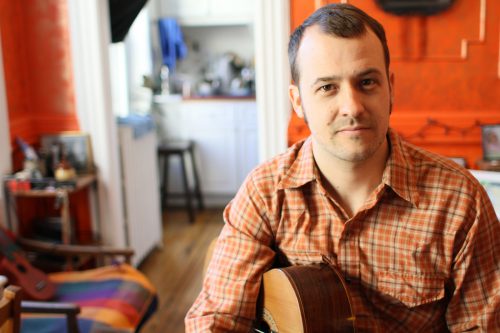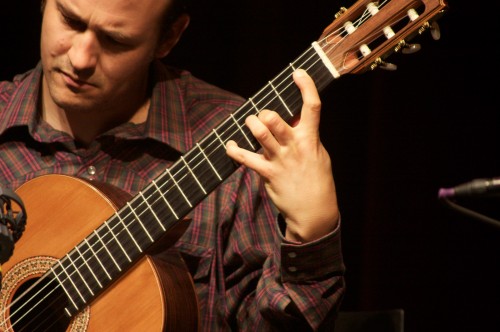Interview with Gyan Riley

Gyan Riley is active as a soloist, ensemble player, composer, and improviser in a wide variety of styles. We bounced off a few questions via email over the past weeks.
CG.org: When did you start playing guitar, and what was your path to serious study?
Gyan: I started playing guitar at age 12, when I won a cheap classical instrument in a raffle. Although I had previously found it difficult to find inspiration in the violin, my former instrument, I didn’t want to ever put the guitar down. It just felt right to me. So I guess serious study began right away…with figuring out how to play all my favorite rock and punk songs in my cassette collection by ear, then learning classical guitar methods soon after that.
CG.org: I have heard that your father, composer Terry Riley, wrote you a guitar piece for one of your birthdays. Can you tell us that story?
Gyan: He wrote Piedad for me as a gift for my 18th birthday. I had just begun studying at the San Francisco Conservatory, and was eagerly eating up as much repertoire as possible. But I found the process of learning that piece fairly daunting at first. Over the years I have revised my interpretation of the piece many times, and have found new solutions to it’s many challenges…but often I find that solving an issue that isn’t satisfying to me musically results in an even greater technical challenge! But of course it’s worth it…
CG.org: You are an improviser as well as a composer. In terms of improvisation, what is your background and your approach to the instrument?
Gyan: Well I began noodling around on the guitar pretty much from the beginning of my relationship with it, but it was years before I approached improvisation as a serious focus. I took an improvisation/fretboard harmony class with Dusan Bogdanovic at the conservatory, and later began full-time studies with him. He introduced to me a completely new way of looking at the instrument from an imrpovisational standpoint, approaching it compositionally rather than just meandering. Of course searching is always a major part of improvisation for me, but I’ve learned that having a larger lens of focus in which you perceive your improvisation can help to create a clearer picture of whatever structure is it you’re going for. Over the years I have also performed a lot with my father. He is incredibly unpredictable, so it’s always a fun challenge to follow him down whatever improvisational road he takes. I think this experience has helped me to react/interact much more intuitively as an improviser. I think being overly analytical with improvisation is a slippery slope. Spontaneous analysis/reaction is great. But if you get too clever with planning an idea, it will quite possibly sound out of place by the time you can execute it.
CG.org: Somewhat relatedly—how do you approach solo improvisations? Do you think more harmonically, melodically, modally, contrapuntally…
Gyan: That completely depends on the improvisation of the moment. Sometimes an improvisation will be all of those things, sometimes none of them. For me the most important thing is to follow my instincts. I think that if you listen to your little internal voice, it will tell you what needs to happen. And if what you do is genuine and honest, your audience will sense that and be moved. Or perhaps not…but at least you will feel good about it!
CG.org: What is the most useful thing that Joe Sixstrings can do to become a better improviser? I must admit it can be pretty daunting, especially if you are used to playing exclusively from sheet music, or exclusively by rote.
 Gyan: I think the first thing is simply to do it. Nine times out of ten when people ask me this question, I ask them how much time they spend each day practicing improvisation, and they say not much, or even or at all! Just like playing scales, arpeggios, composing, or whatever, you have to do it regularly to make progress. And be smart about the way you approach it, by constantly thinking about what it is you want to achieve and evaluating the efficacy of whatever approach you are taking. Ask others whom you admire what their approach is, knowing that it may not work for you, but odds are, you will learn something from studying that approach anyway. One general guideline that seems to work for many people is to start small…smaller than you think. For example, just working with 2 or 3 notes: seeing how many ways you can play those 3 notes. Reodering them, changing the rhythm, playing them fast, slow, loud, soft, as a chord or several chords, with different timbres, in different moods, etc. Setting parameters can actually be quite liberating! Then of course you can expand outward from there gradually, but I find that starting out in this way greatly diminishes the daunting element of improvisation that you mentioned.
Gyan: I think the first thing is simply to do it. Nine times out of ten when people ask me this question, I ask them how much time they spend each day practicing improvisation, and they say not much, or even or at all! Just like playing scales, arpeggios, composing, or whatever, you have to do it regularly to make progress. And be smart about the way you approach it, by constantly thinking about what it is you want to achieve and evaluating the efficacy of whatever approach you are taking. Ask others whom you admire what their approach is, knowing that it may not work for you, but odds are, you will learn something from studying that approach anyway. One general guideline that seems to work for many people is to start small…smaller than you think. For example, just working with 2 or 3 notes: seeing how many ways you can play those 3 notes. Reodering them, changing the rhythm, playing them fast, slow, loud, soft, as a chord or several chords, with different timbres, in different moods, etc. Setting parameters can actually be quite liberating! Then of course you can expand outward from there gradually, but I find that starting out in this way greatly diminishes the daunting element of improvisation that you mentioned.
CG.org: You’ve performed all over the world in a variety of settings. What’s the most fun you’ve had on stage?
Gyan: That’s a tough question. But generally I think that for me, having fun on the stage is a result of being able to play with musicians who are great listeners and improvisers, and having a receptive audience. I can definitely have lots of fun playing solo too, but it’s always an added bonus to have other like-minded co-conspirators to bounce ideas off of.
CG.org: And the least fun?
Gyan: When I was 19, I played my first concert on a cruise ship, after spending the entire day vomiting from seasickness. There was a serious storm the night before and stretching into the day of the show, and the rough waters drove nearly everyone on the ship into a miserable state. The concert was decently attended considering the circumstances, but it was hard to keep it together while the ship was still rocking back and forth. At one point I had to duct tape my music stand to the floor because it kept sliding across the slick hardwood stage!
CG.org: Tell me about your guitars, and your approach to amplification—especially on how you approach a solo vs. an ensemble show (as I imagine sometimes things can get a bit loud!)
Gyan: When I play amplified solo classical guitar, I always just use a microphone becuase I think it sounds the most natural. But when playing in groups at any substantial volume, I find that compensating by using an active pickup (and possibly a mic in front of the guitar as well, if you can hear that signal and avoid bleeding) is almost always necessary, especially when particularly loud instruments are involved.
CG.org: What are you current projects and upcoming releases?
Gyan: I have a brand new new trio project that I’m really happy about. It’s called Eviyan, with singer/violinist Iva Bittová and clarinetist (and Bang On A Can founder) Evan Ziporyn. We are all composers and improvisers, and the combination of these creative forces is really exciting. I have a duo project called Pluck with Chinese guzheng player/singer Wu Fei (we released our first, self-titled, digital only recording last year), a duo with percussionist David Cossin called SuperBalls, and an ongoing duo collaboration with my dad. I play in an electric guitar quartet called Dither, and a 5-piece classical Arabic rock group called Al-Madar, led by Lebanese composer/oud player/flutist Bassam Saba. I am also a member of the Falla Guitar Trio, with Adam del Monte and Kenton Youngstrom. We released an album last year called Excursions.
CG.org: Looks like you’re keeping busy. To our readers—be sure to check out some of Gyan’s projects!
